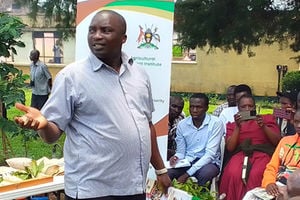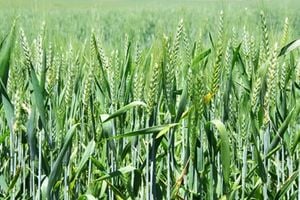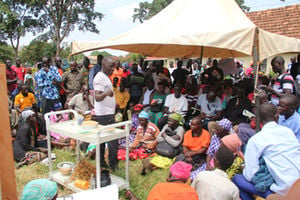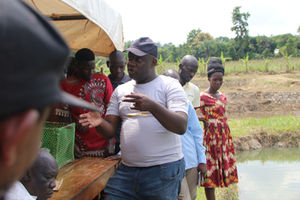
Denis Ashaba, a researcher at Naro Kachwekano, teaches about apple growing PHOTO GEORGE KATONGOLE
Seeds of Gold will hold its Farm Clinic this Saturday in Kabale District at the National Agricultural Research Organisation (Naro)’s Kachwekano Zonal Agricultural Research and Development Institute in Kabale District.
The event will feature training, knowledge-sharing and presentations on the best farming practices and technologies that you can adopt to boost your yields.
Farmers are asked to come with all their questions, which will be answered by experts from Naro, Stanbic bank, and Bank of Uganda, among others.
Enterprises
Like many farmers in Kabale and the neighbouring districts, KaZARDI experts and government agencies have longed for the grand opportunity and platform offered by the roving Seeds of Gold Farm Clinics to address the overflowing agribusiness challenges.
“My team and I are so excited at the opportunity to host the second ever Farm Clinic in Kabale District. We are thankful to God for this opportunity and feel very grateful to the partners who are helping us to host this great event. We are gearing ourselves up and are looking forward to hosting, meeting and interacting with many people,” said Dr Jerome Kubiriba director of research at KaZARDI.
“We have therefore selected enterprises that the farmers are engaged in and have potential to improve their food security and incomes. The crops include apples, irish potatoes, vegetables, citrus fruits and livestock, especially goat farming. These are first on the list for cash and farmers have been requesting for information on how to improve productivity and managing their pests and diseases,” he said.
Apples have generated interested of late as with farmers demand for seedlings. Part of the sub zone has a goat rearing dominant corridor and the farmers would definitely be happy to be trained in management and to know about livestock technologies (including goats).
Challenges Kabale farmers face
Farmers in this Kigezi region have reported several challenges to KaZARDI as a hindrance to agricultural productivity and commercialising agriculture. Perhaps the most challenging is bad weather that has at any one time been experienced by every farmer and it affects both crop and livestock enterprises. Land holdings have continued to reduce for the majority of the farmers and repeated use of the land without fertiliser application has resulted in low fertility causing yields far below what is possible. In most hilly places vegetation has been cleared and there is massive soil erosion with visibly poor crop stands. The other challenges have been pests and diseases of major crops including coffee and bananas. These challenges together with limited access to improved crop varieties and their recommended production practices have hindered them from maximising yields and hence profits.
Other challenges include drudgery (labour intensive farming practices), and post-harvest losses of major crops due to poor storage facilities and challenges in accessing markets.
KaZARDI’s moment to shine
Dr Kubiriba sees the Farm Clinic visit as the biblical manna from heaven: “Naro has information and technologies that can spur agribusiness in Uganda. We have this great opportunity in our KaZARDI station to talk about Naro technologies and provide agricultural information to the public particularly those in our zone. We have trainers to impart knowledge to the farmers. We expect farmers to receive relevant knowledge from us. The farm clinic will no doubt enhance our visibility and let the public know we are available to serve them.”
Ultimate guide to apple farming
Apple growing will be one of the enterprises where farmers will acquire new skills. Below is the best practices for growing apples.
Soil requirements
Apples grow in temperate climates with distinct seasons. They require a chilling period during winter to break dormancy and set fruit properly. The ideal temperature range for apple trees is between 15-24°C during the growing season.
They need full sun exposure for at least six hours a day to produce high-quality fruits. Well-drained soils are best suited for apple cultivation.
Avoid waterlogged or compacted soils, which can restrict root growth and lead to disease issues. A slightly acidic pH level of 6.0-7.0 is optimal for apple trees’ nutrient uptake.
Site selection
The location will directly impact the success of your apple cultivation venture. Look for a sunny area with good air circulation to promote healthy tree growth and fruit development.
Avoid low-lying regions that are prone to frost or waterlogging, as this can negatively affect your apple trees. Ideally, the site should have well-draining soil rich in organic matter to support root growth and nutrient uptake.
Before establishing your orchard, conduct a soil test to find its pH levels and nutrient content. This will help you make informed decisions about soil amendments and fertilisation practices. Proper planning during site selection will set the foundation for a successful apple farming operation in the long run.
Preparing the land for apple planting
Before you plant those apple trees, you need to make sure the soil is just right. Start by clearing the land of any debris or weeds that could hinder their growth.
You want a clean slate for them to thrive on. Once your land is clear, consider making a soil test to find its pH levels and nutrient content.
Based on the results, you may need to amend your soil with organic matter or fertilisers to create an optimal growing environment for future apple orchards.
Remember, healthy soil means healthy trees. Ensure proper drainage on your land to prevent waterlogging, which can harm tree roots.

An expert teaches farmers at a previous Seeds of Gold Farm Clinic. PHOTO/FILE
Planting techniques
Apple trees thrive in well-drained soil and full sunlight. Make sure to prepare the soil by removing weeds and ensuring proper drainage.
Spacing between apple trees is crucial for optimal growth. Most varieties require around 15 to 20 feet of space between each tree to allow for adequate airflow and sunlight penetration. This spacing also facilitates easy harvesting and maintenance.
Consider the layout of your orchard carefully. Planting in rows or a grid pattern can help maximise space utilisation while allowing for efficient irrigation and pest management practices.
Creating alleys between rows will make it easier to access each tree for pruning, fertilising, and harvesting. Utilise planting techniques like digging proper-sized holes for root balls or bare-root systems. Ensure that the graft union remains above ground level when planting grafted trees.
Pruning
Pruning and training apple trees are essential practices for ensuring optimal growth and fruit production. By shaping the tree’s structure, you can promote better air circulation throughout the canopy.
This helps reduce disease incidence and encourages uniform fruit ripening. When pruning apple trees, focus on removing diseased branches to prevent the spread of infections. Additionally, thin out crowded areas to enhance airflow within the tree.
Training young trees involves guiding their growth through careful bending and tying of branches. Proper pruning also stimulates new growth and enhances fruit-bearing potential in the long run.
Pest and disease management
Some common pests you might encounter include the Codling Moth, Apple Maggot, and Aphids. These pests can wreak havoc on your orchard if left unchecked.
Diseases such as apple scab, powdery mildew, and fire blight are also common threats to apple trees.
It is essential to implement proper management strategies to prevent these issues from spreading throughout your orchard.
Integrated pest management practices are recommended to combat pests and diseases effectively. This practice involves using a combination of biological controls, cultural methods, and chemical treatments as a last resort.
Weed control
The effective strategy is mulching around the base of apple trees, which helps suppress weed growth. Mulch also retains moisture and improves soil structure, benefiting tree growth.
Regularly mowing or hand-weeding between rows can prevent weeds from competing with apple trees for nutrients and water.
It’s important to remove weeds before they flower and set seeds to avoid future infestations.
Harvesting
Harvesting apples at the right time is crucial for ensuring optimal quality and flavour.
When picking apples, gently twist them from the tree to avoid damaging the fruit or branches. It is essential to handle apples with care to prevent bruising and maintain their freshness.
Proper storage conditions are key to preserving apple quality – store them in a cool, dark place with controlled humidity levels. Regularly check stored apples for signs of spoilage or rotting.
Remove any damaged fruits promptly to prevent contamination of others. Give freshly harvested apples a thorough wash under running water before selling or consuming them.
Marketing strategies
The key strategy is to establish partnerships with grocery stores, markets, and restaurants to showcase your fresh apples. Collaborating with these outlets can help increase visibility and reach a wider customer base.
Another strategy is to make an online presence through social media and a dedicated website. Utilise engaging content such as photos of your orchard, apple recipes, and customer testimonials to attract potential buyers.
Seeds of Gold Farm clinics explained
The Seeds of Gold Farm Clinic is a, one-stop shop event, designed to empower farmers with knowledge and resources to improve their agricultural practices. Imagine it like a health clinic for your farm, but instead of doctors, you have agricultural experts. Overall, the Seeds of Gold Farm Clinic aims at:
Knowledge sharing: The Seeds of Gold Farm Clinic bridges the gap between farmers and agricultural experts. It provides a platform for farmers to gain practical knowledge on best practices, improved seeds and breeds, and effective farming techniques.
Boosting productivity: By equipping farmers with the right tools and information, the programme enhances agricultural productivity and empower farmers to run their businesses more efficiently.
Nationwide impact: The Seeds of Gold Farm Clinic rotates throughout Uganda, ensuring various regions benefit from its expertise. This ensures knowledge reaches a wider audience and fosters agricultural growth across the country.
MARKETING STRATEGIES
The key strategy is to establish partnerships with grocery stores, markets, and restaurants to showcase your fresh apples. Collaborating with these outlets can help increase visibility and reach a wider customer base.
FARM CLINIC AT KAZARDI
What: Seed of Gold Farm Clinic
Enterprises: Citrus fruits, apples, beans, sorghum, vegetables, livestock, Irish potatoes
Topics: Agribusiness, crop/ livestock management and health, post-harvest handling, crop and livestock species
Where: Kabale District
Time: 7:30am
Entrance: Free
Theme: Climate smart farming








